Search Posts
Recent Posts
- Real Estate in RI: Seaside waterfront communities are all the rage. Who’s buying – Emilio DiSpirito June 6, 2025
- Outdoors in RI: 2A votes, Charter Yachts, active summer programs, garden tours, aquatic weeds… June 6, 2025
- All About Home Care, with two Rhode Island locations, closing after 22 years in business June 6, 2025
- GriefSPEAK: Angel wings with footprints – Mari Nardolillo Dias June 6, 2025
- Rhode Island Weather for June 6, 2025 – Jack Donnelly June 6, 2025
Categories
Subscribe!
Thanks for subscribing! Please check your email for further instructions.
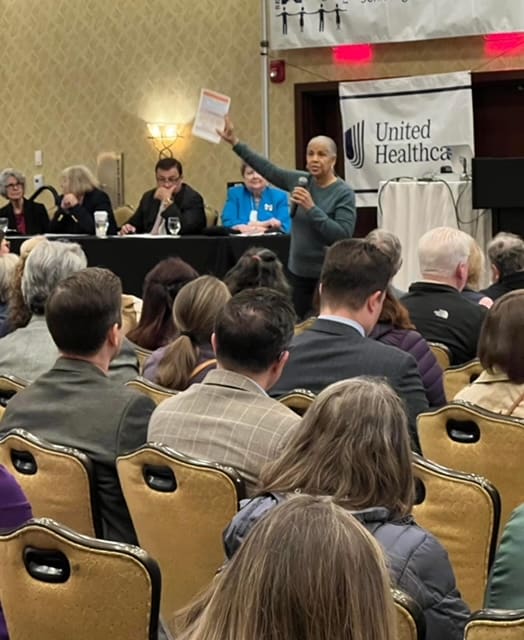
Senior Agenda Coalition of RI unveils legislative agenda to packed house of seniors – Herb Weiss
By Herb Weiss, contributing writer on aging issues
Last Wednesday, the main ballroom at the Crowne Plaza in Warwick was filled, to capacity. Hundreds came to the Senior Agenda Coalition of RI’s (SACRI) 2024 Legislative Leaders Forum to learn about the advocacy group’s issue priorities. House and Senate leadership, along with members of both caucuses came to listen, learn and to respond to SACRI’s four priority issues for 2024.
“We’re back, and we are stronger than ever,” announced Maureen Maigret, SACRI’s Policy Advisor, to 275 attendees who came to this year’s annual legislative forum held on March 27, 2024. Before she unveiled SACRI’s ambitious legislative priorities she painted a demographic picture of older Rhode Islanders.
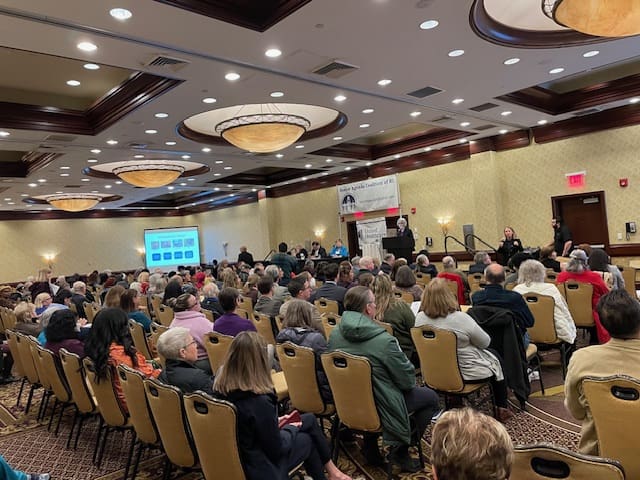
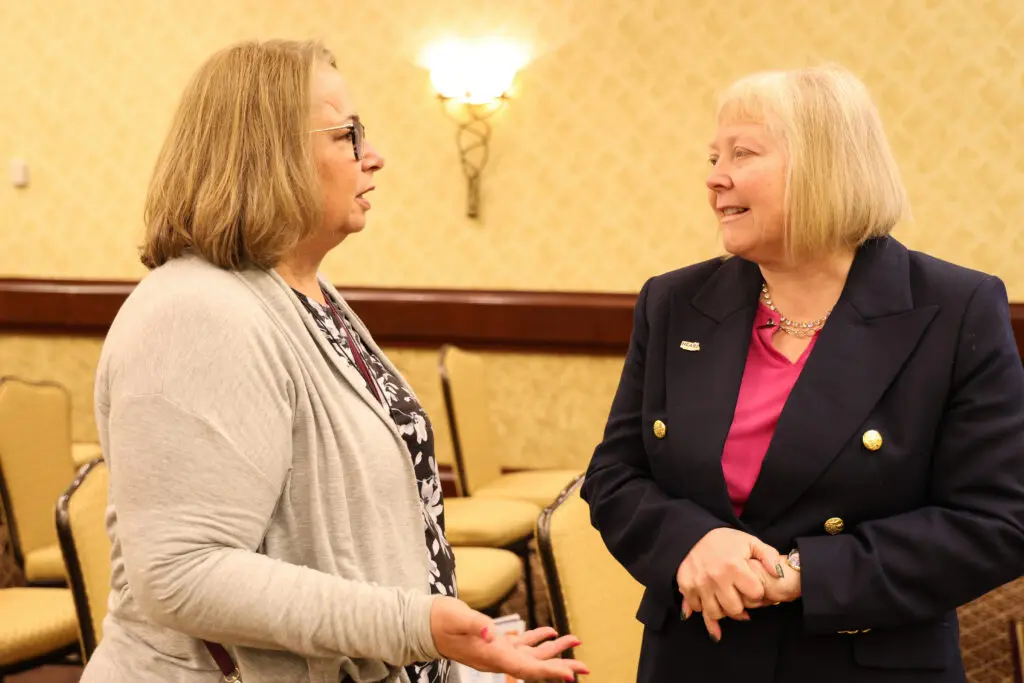

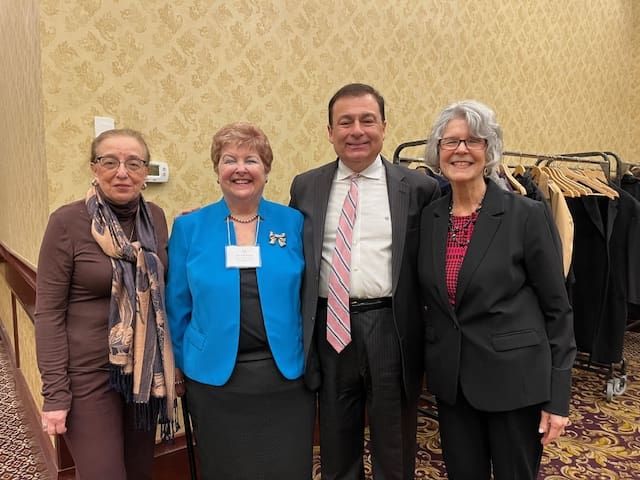
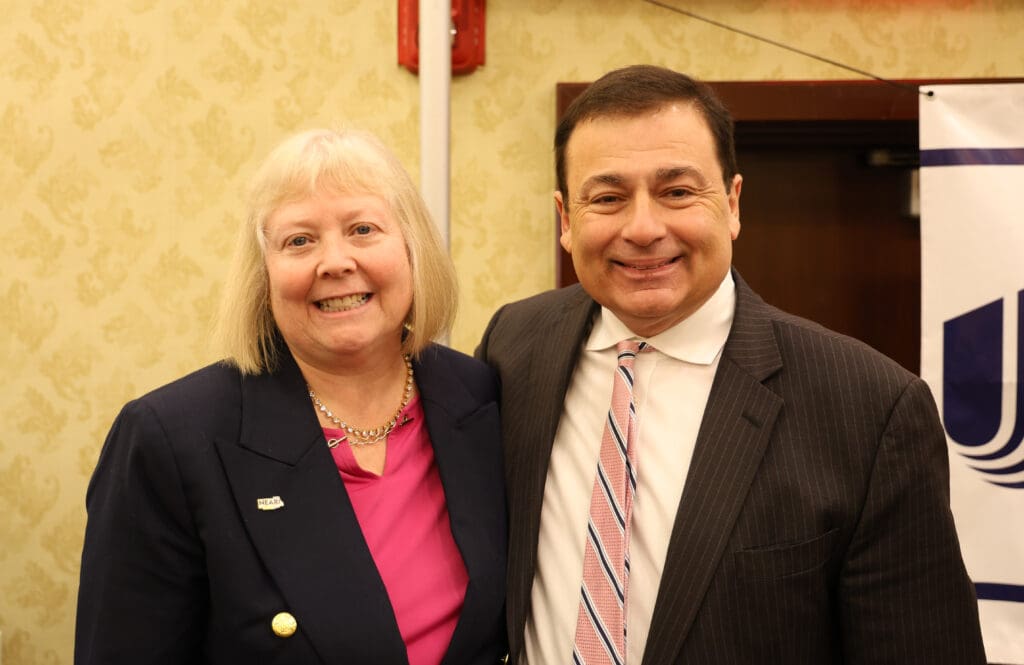
The graying of Rhode Island’s population
“We know that 200,000 Rhode Islanders are age 65 and over, and this number is growing,” noted Maigret. According to the former state legislator and Director of the Department of Elderly Affairs, in just six years, 1 in 5 persons will be age 65 and over. Today, 20% of the population in 18 Rhode Island communities are in their mid-sixties and over.
Many seniors still work. They pay taxes, provide care to loved ones, volunteer to contribute to their communities, and religiously vote,” stated Maigret, who noted that they contribute over $3.28 billion to Rhode Island’s economy through Social Security benefits.
Maigret pointed out that as the older population ages, the percentage of woman increases over men. At age 65 and over , 56% of this age distribution are woman, 44% are men. At age 85 and over, the percentage of women rapidly increase to 69% compared to 31% for men. And in nursing homes, 68% of residents are woman while 32% are men.
According to the U.S. Census Bureau, many older Rhode Islanders have limited incomes. Twenty-seven percent of age 65+ households earn less than $25,000 a year, while 50% earn less than $50,000 a year.
With women leaving their jobs over the years to raise their family, it is no surprise to Maigret that women’s incomes are less than men, this ultimately resulting in a smaller Social Security benefit. The average Social Security benefits of women aged 65 and over ($20,333) is $5,000 less than their male counterparts ($25,204), she says.
Unveiling SACRI’s Legislative Agenda
“Keeping seniors strong” is the theme of this year’s legislative forum, Maigret told the hundreds of seniors and aging advocates in attendance before announcing the SACRI priorities. SACRI is pushing for legislative issues in the areas of:
- Economic Security
- Supports at Home
- Community Connections
- Housing Options
She called on the House Speaker K. Joseph Shekarchi (D-Dist. 23, Warwick), and Senate Majority Whip, Valarie Lawson (D-Dist. 14, East Providence), in attendance, to support House and Senate legislation, and state budget proposals to address these issues.
SACRI’s top legislative priority is to address Economic Security issues. Polls show that healthcare affordability is a major concern, and this impacts many seniors. Maigret pointed out that Medicare premiums and co-payment gaps have a major impact on low-income Rhode Islanders who struggle to pay for healthcare, food, rent and basic needs.”
According to Maigret, legislative proposals (S. 2399/H. 7333) would be a legislative fix to reduce high out-of-pocket costs for persons on Medicare. The bills would expand income eligibility for the Medicare Savings Program (MSP), helping an estimated 17,000 low-income seniors and disabled residents pay their $175/month Medicare Part B premium and covering co-pays and deductibles for those with very low-income.
Thousands of low-income seniors and persons with disabilities on Medicare, but not eligible to participate in the state’s Medicaid program, struggle each month to pay their Medicare Part B premiums and co-pay costs for services and prescription drugs causing many to forgo needed health care as they cannot afford to pay the co-payments.
And eligibility to join MSP qualifies those on Medicare to enroll in the federal Extra Help program that provides significant additional financial assistance to pay for prescription medications.
SACRI also calls on the state lawmakers to provide necessary funding in the 2025 Fiscal Year Budget to enhance programs to assist seniors to age in place in their communities. “It’s a very important legislative issue for seniors,” notes Maigret, stressing that most seniors want to stay at home when they need care.
In large part due to the existing home care staffing shortage, 75% of those referred for state-subsidized home care wait two months or more for these services. A state study recommended home care rate increases to improve access to home health care services which would help to address the worker shortage and provide livable wages for home care workers. Maigret urged Shekarchi and Lawson to put funding in this year’s budget to implement the study’s recommendations.
Meanwhile, SACRI supports increased funding for local Senior Centers to enable them to continue to provide “community connections” to seniors. “They do amazing work by offering meal programs, technology assistance and training and all kinds of social, health and recreations programs, says Maigret.
Seniors benefit from, and enjoy going to Senior Centers, adds Maigret, reflecting on a comment told to her by a senior attending Warwick’s Pilgrim Senior Center. “It’s my home away from home,” she says.
Governor Dan McKee’s Fiscal Year 2025 Budget would distribute $1.4 million (about $7 per person aged 65 and over in each community) to the local communities for Senior Centers and programs. SACRI calls on the General Assembly to increase this budget allocation by about $660,000 (making the funding tied to $10 per person aged 65 and over. “It’s a small funding request,” says Maigret.
Finally, SACRI urges the General Assembly to continue to address the lack of options and affordability of housing for seniors. Maigret notes that this problem is the result of the state’s growing older population with fixed incomes, combined with low housing production, skyrocketing rent increases, and high property taxes,
There are many legislative remedies to address the state’s housing crisis, says SACRI, calling on the General Assembly to use a portion of the proposed Housing Bonds to support affordable housing options for older Rhode Islanders. She also suggested that lawmaker’s continue funding the Home Modification Program, expanding the Property Tax Relief Program and finally promoting accessibility features in new housing developments.
Like previous years, SACRI worked hard to drive home the point of putting a spotlight to its legislative agenda by having “storytellers” translated the priorities into personal stories.
House Speaker talks turkey at Legislative Forum
Aging is a very important and personal issue to House Speaker Shekarchi, who is taking care of his 98-year-old father, who remains at home. “That is where he wants to be, he says. “I know that not everyone is fortunate – not everyone has the same support system,” says Shekarchi. “But it’s important that seniors have options so they can choose what’s best for them,” he says
“We need to provide support for seniors to age in place and to remain in their homes, living independently,” states Shekarchi. A great option – which is also the top legislative priority for AARP Rhode Island this year – is creating Accessory Dwelling Units (ADUs). They enable seniors – even young college graduates – to live independently while remaining near family and others, he adds.
“As for seniors who live in assisted living facilities and nursing homes, we need to ensure those facilities are adequately staffed, and that caregivers are paid a sustainable wage,” says Shekarchi.
“We expect this to be a very challenging budget year, with many worthwhile, but competing, priorities,” says Shekarchi.
“I know the Senior Agenda has legislative priorities in 2024 that I promise we will consider very carefully. And I have a request for all of you. Please stay involved, make your voices heard at the State House,” Shekarchi suggests, “give us feedback. You can testify in person at the State House, or in writing by letter or email.
Valarie Lawson, Senate Majority Whip, took the opportunity to discuss the Rhode Island HEALTH Initiative… a Senate legislative package designed to address affordability and accessibility of health care in the state.
According to Lawson, the HEALTH Initiative seeks to ensure the strength of the state’s community hospitals, attract, and retain primary care doctors and makes sure Rhode Islanders can access quality, affordable care. The legislation includes a bill by Sen. Alana DiMario to create a drug affordability commission in Rhode Island … which is a critical step to make the state’s prescription drug system less complicated and less costly. And Sen. V. Susan Sosnowski’s legislation to transform and mandate a continuous Medicaid reimbursement rate review process by the Office of the Health Insurance Commission.
Lawson noted the Senate was working on the SACRI MSP priority legislation and that she is a co-sponsor of the bill. She said that the Senate shares the Senior Agenda’s priority of making Rhode Island a place where residents can age with comfort and security. “At the State House… we rely on your voices to help guide us,” she said.
Call to Action
Diane Santos, SACRI Board Chair, ended the forum with a Call to Action for attendees to let their voices be heard by contacting their local legislators to express their concerns and to support programs to help keep seniors strong.
SACRI Legislative Leaders Forum organizational partners included: Cranston Enrichment Center, Edward King House, Leon Mathieu Senior Center, Meals on Wheels RI, Pilgrim Senior Center, Ocean State Center for Independent Living, St. Martin de Porres Center, The RI Organizing Project and The Village Common of RI.
To watch the 2024 Senior Agenda Coalition Leaders Forum Conference, go to:
https://capitoltvri.cablecast.tv/show/9023
___

Herb Weiss, LRI -12, is a Pawtucket-based writer who has covered aging, health care and medical issues for over 43 years. To purchase his books, Taking Charge: Collected Stories on Aging Boldly and a sequel, compiling weekly published articles, go to herbweiss.com.


Thanks for the senior corner information – the Medicare Trust Funds should look at the Payroll Tax to increase as well as the general fund that are contributed …. and the Social Security Payroll Tax should be increased (instead about talking about increasing its AGE threshold) per one’s income (reasonably allow another $100,000 per year added to the current level), the Internet can and should be (regulated) Taxed (either special appropriations into the Medicare Trust Fund for corresponding costs.
Our state government should also tag an inflation fee to its contribution with Medicaid to ensure Home Care support is provided instead of sick and older folks being placed on a waiting list ……
And the federal government should adopt the current bill in the Congress – has been bandied about since 2010 – to bring the SSI [Disability] Program into the 21st Century with foolish penalties and poverty-ridden income.
Appreciate the time – Blessed Passover & Easter!